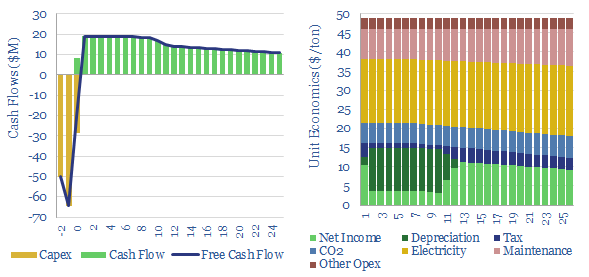This economic model captures the cost of capturing CO2 using membranes, with a base case of $50/ton to earn 10% IRRs on early commercial deployments, and a possibility of deflating to $20/ton in next-generation membranes.
A good membrane for CO2 capture should have a CO2 selectivity (versus Nitrogen) above 125x, and a CO2 permeance above 100 GPU, which means 0.67 m2 of membranes are needed per m3 of feed gas per hour. This membrane also needs to be stable, without degradation, for around 5-10 years. It also needs to cost around c$50/m2.
An exceptional membrane for CO2 capture should have a CO2 selectivity (versus Nitrogen) above 200x, and a CO2 permeance above 2,500 GPU, which means 0.1 m2 of membranes are needed per m3 of feed gas per hour.
Low pressure separation is also important, as compression energy costs comprise around a 13% energy penalty in this model.
Membrane stability is also important, as our recent research has highlighted how amines and other CO2-reactive compounds can degrade, especially in the presence of impurities.
The data-file allows you to stress test the costs of separating CO2 and nitrogen, as a function of membrane selectivity (x), membrane permeance (GPU), membrane costs ($/m2), capex costs ($M), CO2 concentration in the feed gas (%), pressure (bar), electricity use (kWh/ton), electricity prices (c/kWh), maintenance ($/ton), and CO2 prices ($/ton).
Useful data-points into the cost of capturing CO2 using membranes are compiled in the back-up tabs from technical papers and academic studies, into membrane permeance (GPU), selectivity (x), thicknesses (μm) and flux rates (m3/hour/m2 of membranes).
There is a question mark about whether membranes that satisfy permeability, selectivity and stability requirements will also be low cost. $50/m2 is a ‘target’ that is suggested in a large number of technical papers that crossed our screens. Whereas some of the highest-grade industrial membranes today can be as costly as $5,000/m2.
All of our broader CCS research is summarized in chronological order on our CCS category page. Our deep-dive note into membrane CO2 separations is linked here.
